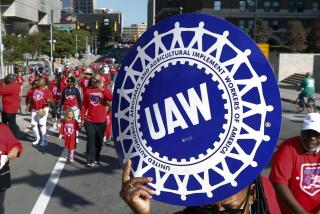Union leaders not giving up on the South
Union leaders were still reeling three days after their devastating defeat at a Tennessee Volkswagen plant, but the leader of the AFL-CIO said labor would keep trying to organize workers in the South — even if it’s an uphill battle.
“We are committed to helping those workers in the South raise their wages, get better working conditions and get a stronger voice on the job in making decisions that affect their livelihood,” Richard Trumka told reporters Monday.
Trumka was in Houston to talk about the year ahead with the executive council of his coalition, which represents 56 unions and 12.5 million workers. As far as organizing goes, this year looks as gloomy as any in recent memory.
On Friday, workers at a Chattanooga Volkswagen plant narrowly rejected joining the United Auto Workers, even though Volkswagen did not oppose unionization. The plant was considered labor’s best chance to gain a foothold in the South.
Trumka downplayed the defeat, however, calling it impressive that the result was close: 712 to 626.
“Not many years ago, this kind of union election in Chattanooga would have been unthinkable,” he said. “But today it was very real.”
It may be extremely difficult to make progress in the South anytime soon, said Richard W. Hurd, a labor professor at Cornell University. Union support falls along racial lines there, he said, and white Southern males largely mistrust unions. The majority of the workers in the Chattanooga plant are white.
“Unions are seen as organizations formed in the North, which causes suspicions among white Southerners,” Hurd said. “As the South becomes more Latino, there is potential for growth, but until that demographic phenomenon begins to tilt that way, it’s a tough road.”
Anti-labor groups in Tennessee played this distrust to their advantage, paying for billboards that read, “The UAW spends millions to elect liberal politicians, including Barack Obama.”
Trumka pointed to small successes in the South, including a 1,200-worker poultry plant in Alabama that organized in 2012. Data from the Bureau of Labor Statistics show that some states, including Alabama, South Carolina and Tennessee, gained union members between 2012 and 2013, but that is probably because previously organized businesses added employees. Other Southern states, including Florida, Mississippi and Louisiana, shed union members over the same period.
Union membership stands at 11.3% nationally, down from 20.1% in 1983. Labor has recognized that it must go beyond organizing drives if it is to survive.
Since Trumka took over in 2009, the AFL-CIO has focused on raising the minimum wage and improving the workplace for all employees. Those issues don’t directly affect most union members, since they make more than the minimum wage and have union representatives to stick up for them. But they can improve unions’ image.
Labor was instrumental in organizing recent walk-outs by fast-food workers to draw attention to low wages. And the pope and President Obama have seized on raising the minimum wage.
“Raising wages is a framework that unifies all our work and can literally drive a new national agenda,” Trumka said.
A majority of Americans supports boosting the minimum wage, polls show. (The federal minimum stands at $7.25 an hour.) On the other hand, barely half of Americans see unions in a favorable light.
“The one place the AFL-CIO is making progress is the social policy front,” said Nelson Lichtenstein, a professor of labor at UC Santa Barbara. “The minimum wage thing is almost a textbook case of how to put an issue on the agenda and how to gain traction.”
Making life better for all workers can help labor in the long run, Lichtenstein said. Workers who benefit from a higher minimum wage may not be union members now, he said, but they may be willing to join in the future if their jobs are more secure.
More to Read
Start your day right
Sign up for Essential California for news, features and recommendations from the L.A. Times and beyond in your inbox six days a week.
You may occasionally receive promotional content from the Los Angeles Times.







